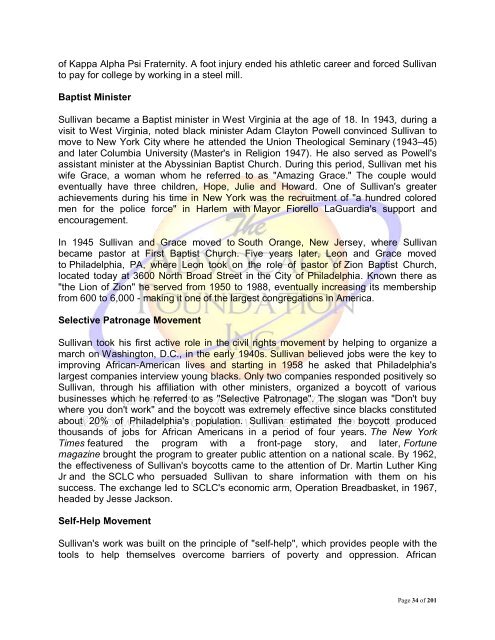You also want an ePaper? Increase the reach of your titles
YUMPU automatically turns print PDFs into web optimized ePapers that Google loves.
<strong>of</strong> Kappa Alpha Psi Fraternity. A foot injury ended his athletic career and forced Sullivan<br />
to pay for college by working in a steel mill.<br />
Baptist Minister<br />
Sullivan became a Baptist minister in West Virginia at the age <strong>of</strong> 18. In 1943, during a<br />
visit to West Virginia, noted black minister Adam Clayton Powell convinced Sullivan to<br />
move to New York City where he attended the Union <strong>The</strong>ological Seminary (1943–45)<br />
and later Columbia University (Master's in Religion 1947). He also served as Powell's<br />
assistant minister at the Abyssinian Baptist Church. During this period, Sullivan met his<br />
wife Grace, a woman whom he referred to as "Amazing Grace." <strong>The</strong> couple would<br />
eventually have three children, Hope, Julie and Howard. One <strong>of</strong> Sullivan's greater<br />
achievements during his time in New York was the recruitment <strong>of</strong> "a hundred colored<br />
men for the police force" in Harlem with Mayor Fiorello LaGuardia's support and<br />
encouragement.<br />
In 1945 Sullivan and Grace moved to South Orange, New Jersey, where Sullivan<br />
became pastor at First Baptist Church. Five years later, Leon and Grace moved<br />
to Philadelphia, PA, where Leon took on the role <strong>of</strong> pastor <strong>of</strong> Zion Baptist Church,<br />
located today at 3600 North Broad Street in the City <strong>of</strong> Philadelphia. Known there as<br />
"the Lion <strong>of</strong> Zion" he served from 1950 to 1988, eventually increasing its membership<br />
from 600 to 6,000 - making it one <strong>of</strong> the largest congregations in America.<br />
Selective Patronage Movement<br />
Sullivan took his first active role in the civil rights movement by helping to organize a<br />
march on Washington, D.C., in the early 1940s. Sullivan believed jobs were the key to<br />
improving African-American lives and starting in 1958 he asked that Philadelphia's<br />
largest companies interview young blacks. Only two companies responded positively so<br />
Sullivan, through his affiliation with other ministers, organized a boycott <strong>of</strong> various<br />
businesses which he referred to as "Selective Patronage". <strong>The</strong> slogan was "Don't buy<br />
where you don't work" and the boycott was extremely effective since blacks constituted<br />
about 20% <strong>of</strong> Philadelphia's population. Sullivan estimated the boycott produced<br />
thousands <strong>of</strong> jobs for African Americans in a period <strong>of</strong> four years. <strong>The</strong> New York<br />
Times featured the program with a front-page story, and later, Fortune<br />
magazine brought the program to greater public attention on a national scale. By 1962,<br />
the effectiveness <strong>of</strong> Sullivan's boycotts came to the attention <strong>of</strong> Dr. Martin Luther King<br />
Jr and the SCLC who persuaded Sullivan to share information with them on his<br />
success. <strong>The</strong> exchange led to SCLC's economic arm, Operation Breadbasket, in 1967,<br />
headed by Jesse Jackson.<br />
Self-Help Movement<br />
Sullivan's work was built on the principle <strong>of</strong> "self-help", which provides people with the<br />
tools to help themselves overcome barriers <strong>of</strong> poverty and oppression. African<br />
Page 34 <strong>of</strong> 201

















